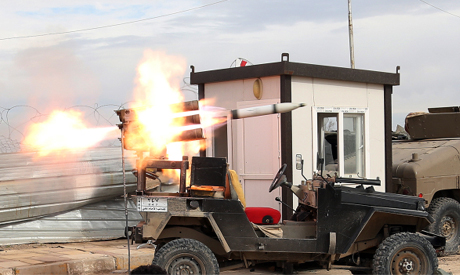
Members of an Iraqi Shia militant group called Imam Ali Brigades launch rockets against Islamic State extremist positions during clashes in Tikrit, 130 kilometers (80 miles) north of Baghdad, Iraq, Tuesday, March 24, 2015
Washington is considering launching air strikes, possibly within days, to back up Iraqi and Shia forces battling to recapture Tikrit from the Islamic State militant group, US officials said.
The statement came Tuesday after an official said the US was already providing reconnaissance support for Iraqi forces there, the first confirmation of American involvement in the operation.
Such assistance could help Iraqi forces move forward with their largest operation against IS militants to date, which enjoyed initial success but has since stalled into a siege, with the city surrounded but not retaken.
A US-led coalition has targeted IS with air strikes and provided training and equipment to Iraqi forces, but had not previously announced direct assistance for the Tikrit operation, in which Iran has played a major role.
Possible air strikes near Tikrit are "being discussed at a high level" and could be days or weeks away, a US official told".
The delicate diplomatic and military aspects of such an option are still being worked out, said the official, who spoke on condition of anonymity.
In a shift, the coalition as of March 21 began providing intelligence from surveillance flights for the Tikrit assault, a senior coalition military official said earlier in Baghdad.
US officials in Washington confirmed the account of "an eye in the sky" for the Iraqi troops and Iranian-backed Shia militia.
President Barack Obama's administration has insisted it does not coordinate military operations directly with Iran.
But the surveillance flights and discussions on possible US air raids in Tikrit illustrate how Washington is moving towards greater indirect collaboration with Tehran, despite the intense distrust between the two arch-foes.
IS led a sweeping offensive last June that overran large areas north and west of Baghdad, including Tikrit, the capital of Salaheddin province and executed dictator Saddam Hussein's home town.
Iraqi security forces initially fared poorly against IS, with multiple divisions collapsing in the north, but have since made major gains against militants with the aid of tens of thousands of allied paramilitaries, the US-led coalition and Iran.
The operation to retake Tikrit, which involves thousands of Iraqi soldiers, police and forces known as Popular Mobilisation units, which are dominated by Shia militias, began on March 2.
It has succeeded in retaking towns leading to Tikrit, and also in surrounding several hundred militants in the city.
But capturing Tikrit itself has proved more difficult because of the militants' extensive defensive works, including a huge number of bombs planted in streets and buildings.
Iraq's interior minister announced last week that the operation had been halted temporarily to avoid casualties and to protect infrastructure in the city.
Army Staff Lieutenant General Abdulwahab al-Saadi, a top commander in Salaheddin province, told AFP on March 15 that coalition air support was needed in Tikrit, and that he had requested that the Iraqi defence minister ask for it.
But that was apparently not immediately done, with a Pentagon spokesman saying five days later that he was unaware of any official requests "to participate in operations around Tikrit".
The issue of foreign air support, especially from the United States, is a point of contention between the Iraqi military and militiamen fighting alongside it.
Hadi al-Ameri, the commander of the powerful Iran-backed Badr militia, told journalists on Sunday that: "Some of the weaklings in the army... say we need the Americans, while we say we do not need the Americans."
The US faces a delicate balancing act in anti-IS efforts in Iraq, where working against the militants sometimes means taking part in operations that are also assisted by rival Iran, and involving militias that fought against American forces in past years.
Meanwhile the Canadian government said Tuesday that its air strikes against the Islamic State group in Iraq would be extended one year to March 2016 and may see sorties into Syria.
But no ground combat troops would be deployed under the plan, which is to be debated in parliament Thursday.

No comments:
Post a Comment
Note: Only a member of this blog may post a comment.